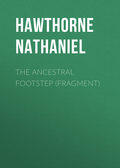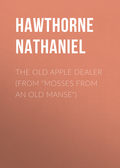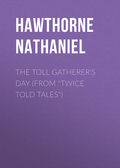
Натаниель Готорн
The Miraculous Pitcher
But, we are sorry to say, the people of this lovely village were not worthy to dwell in a spot on which Heaven had smiled so beneficently. They were a very selfish and hard-hearted people, and had no pity for the poor, nor sympathy with the homeless. They would only have laughed, had anybody told them that human beings owe a debt of love to one another, because there is no other method of paying the debt of love and care which all of us owe to Providence. You will hardly believe what I am going to tell you. These naughty people taught their children to be no better than themselves, and used to clap their hands, by way of encouragement, when they saw the little boys and girls run after some poor stranger, shouting at his heels, and pelting hum with stones. They kept large and fierce dogs, and whenever a traveller ventured to show himself in the village street, this pack of disagreeable curs scampered to meet him, barking, snarling, and showing their teeth. Then they would seize him by his leg, or by his clothes, just as it happened; and if he were ragged when he came, he was generally a pitiable object before he had time to run away. This was a very terrible thing to poor travellers, as you may suppose, especially when they chanced to be sick, or feeble, or lame, or old. Such persons (if they once knew how badly these unkind people, and their unkind children and curs, were in the habit of behaving) would go miles and miles out of their way, rather than try to pass through the village again.
What made the matter seem worse, if possible, was that when rich persons came in their chariots, or riding on beautiful horses, with their servants in rich liveries attending on them, nobody could be more civil and obsequious than the inhabitants of the village. They would take off their hats, and make the humblest bows you ever saw. If the children were rude, they were pretty certain to get their ears boxed; and as for the dogs, if a single cur in the pack presumed to yelp, his master instantly beat him with a club, and tied him up without any supper. This would have been all very well, only it proved that the villagers cared much about the money that a stranger had in his pocket, and nothing whatever for the human soul, which lives equally in the beggar and the prince.
So now you can understand why old Philemon spoke so sorrowfully, when he heard the shouts of the children and the barking of the dogs, at the farther extremity of the village street. There was a confused din, which lasted a good while, and seemed to pass quite through the breadth of the valley.
“I never heard the dogs so loud!” observed the good old man.
“Nor the children so rude!” answered his good old wife.
They sat shaking their heads, one to another, while the noise came nearer and nearer; until, at the foot of the little eminence on which their cottage stood, they saw two travellers approaching on foot. Close behind them came the fierce dogs, snarling at their very heels. A little farther off, ran a crowd of children, who sent up shrill cries, and flung stones at the two strangers, with all their might. Once or twice, the younger of the two men (he was a slender and very active figure) turned about, and drove back the dogs with a staff which he carried in his hand. His companion, who was a very tall person, walked calmly along, as if disdaining to notice either the naughty children, or the pack of curs, whose manners the children seemed to imitate.
Both of the travellers were very humbly clad, and looked as if they might not have money enough in their pockets to pay for a night’s lodging. And this, I am afraid, was the reason why the villagers had allowed their children and dogs to treat them so rudely.
“Come, wife,” said Philemon to Baucis, “let us go and meet these poor people. No doubt, they feel almost too heavy-hearted to climb the hill.”
“Go you and meet them,” answered Baucis, “while I make haste within doors, and see whether we can get them anything for supper. A comfortable bowl of bread and milk would do wonders towards raising their spirits.”
Accordingly, she hastened into the cottage. Philemon, on his part, went forward, and extended his hand with so hospitable an aspect that there was no need of saying, what nevertheless he did say, in the heartiest tone imaginable, —
“Welcome, strangers! welcome!”
“Thank you!” replied the younger of the two, in a lively kind of way, notwithstanding his weariness and trouble. “This is quite another greeting than we have met with yonder, in the village. Pray, why do you live in such a bad neighborhood?”
“Ah!” observed old Philemon, with a quiet and benign smile, “Providence put me here, I hope, among other reasons, in order that I may make you what amends I can for the inhospitality of my neighbors.”
“Well said, old father!” cried the traveller, laughing; “and, if the truth must be told, my companion and myself need some amends. Those children (the little rascals!) have bespattered us finely with their mud-ball; and one of the curs has torn my cloak, which was ragged enough already. But I took him across the muzzle with my staff; and I think you may have heard him yelp, even thus far off.”
Philemon was glad to see him in such good spirits; nor, indeed, would you have fancied, by the traveller’s look and manner, that he was weary with a long day’s journey, besides being disheartened by rough treatment at the end of it. He was dressed in rather an odd way, with a sort of cap on his head, the brim of which stuck out over both ears. Though it was a summer evening, he wore a cloak, which he kept wrapt closely about him, perhaps because his under garments were shabby. Philemen perceived, too, that he had on a singular pair of shoes; but, as it was now growing dusk, and as the old man’s eyesight was none the sharpest, he could not precisely tell in what the strangeness consisted. One thing, certainly, seemed queer. The traveller was so wonderfully light and active, that it appeared as if his feet sometimes rose from the ground of their own accord, or could only be kept down by an effort.
“I used to be light-footed, in my youth,” said Philemen to the traveller. “But I always found my feet grow heavier towards nightfall.”
“There is nothing like a good staff to help one along,” answered the stranger; “and I happen to have an excellent one, as you see.”
This staff, in fact, was the oddest-looking staff that Philemon had ever beheld. It was made of olive-wood, and had something like a little pair of wings near the top. Two snakes, carved in the wood, were represented as twining themselves about the staff, and were so very skilfully executed that old Philemon (whose eyes, you know, were getting rather dim) almost thought them alive, and that he could see them wriggling and twisting.
“A curious piece of work, sure enough!” said he. “A staff with wings! It would be an excellent kind of stick for a little boy to ride astride of!”
By this time, Philemon and his two guests had reached the cottage-door.
“Friends,” said the old man, “sit down and rest yourselves here on this bench. My good wife Baucis has gone to see what you can have for supper. We are poor folks; but you shall be welcome to whatever we have in the cupboard.”
The younger stranger threw himself carelessly on the bench, letting his staff fall, as he did so. And here happened something rather marvellous, though trifling enough, too. The staff seemed to get up from the ground of its own accord, and, spreading its little pair of wings, it half hopt, half flew, and leaned itself against the wall of the cottage. There it stood quite still, except that the snakes continued to wriggle. But, in my private opinion, old Philemon’s eyesight had been playing him tricks again.
Before he could ask any questions, the elder stranger drew his attention from the wonderful staff, by speaking to him.







